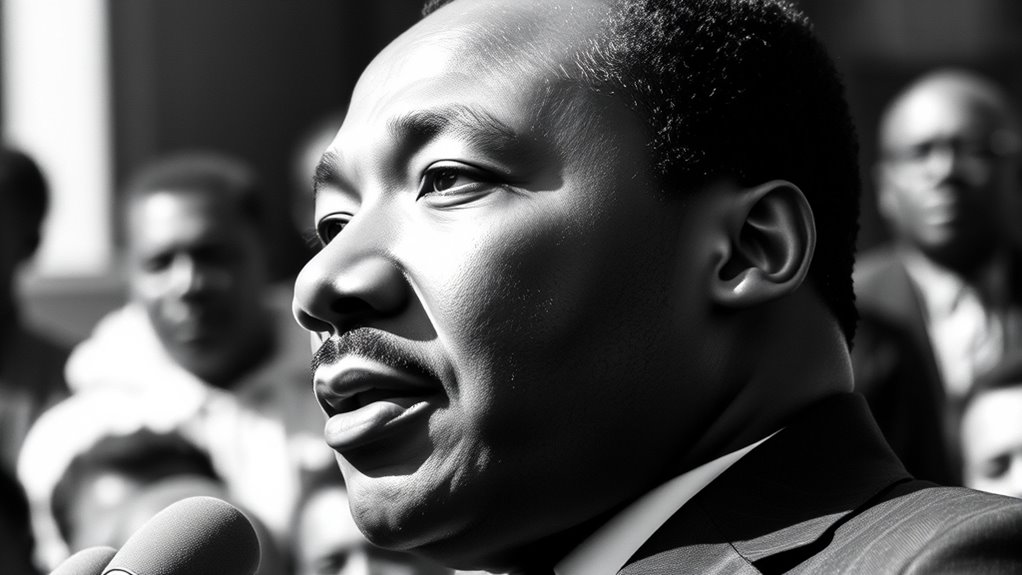The untold story behind Martin Luther King Jr.’s powerful lines reveals more than their words; it’s about the deep moral strategy he used. His speeches, like “I Have a Dream,” were rooted in faith, justice, and nonviolence, serving as rallying cries that challenged injustice with compassion. His leadership was about more than rhetoric—it involved careful planning and moral courage. To truly understand their impact, you’ll discover how he turned words into hope and change.
Key Takeaways
- King’s powerful lines were rooted in strategic nonviolent resistance, aimed at moral persuasion rather than confrontation.
- His speeches drew from religious, justice, and dignity principles, highlighting their deep historical and ideological roots.
- The words served as rallying cries that mobilized communities through hope, resilience, and moral strength.
- Behind the iconic phrases was a deliberate effort to challenge injustice without perpetuating violence.
- His leadership and words reflect a calculated balance of moral conviction and strategic thinking to foster change.

Have you ever wondered what stories lie behind the famous lines of Martin Luther King Jr.? His words resonate deeply, but their true power comes from the history and ideals that fueled them. King’s speeches weren’t just poetic expressions; they were rallying cries rooted in a relentless pursuit of civil rights and a firm belief in nonviolence. You might know the iconic “I Have a Dream” speech, but understanding the context behind his words reveals the resilience and strategic thinking that made his message so compelling.
King’s commitment to civil rights was born out of a vision where equality was not just a dream but a tangible reality for all. At a time when segregation and racial injustice were institutionalized, he understood that change could only come through persistent, nonviolent resistance. His philosophy of nonviolence wasn’t passive; it was a powerful tool that challenged injustice without perpetuating violence. King believed that nonviolence was the only way to achieve lasting change, and his leadership inspired millions to stand up peacefully against oppression.
Behind his most famous lines, there’s a story of struggle and strategic patience. King knew that violence only hardened the hearts of opponents and undermined the moral high ground of the civil rights movement. His speeches often emphasized love, understanding, and the moral power of nonviolent protest. He saw nonviolence as a moral duty—an act of courage that required strength and conviction. It was a deliberate choice to confront hatred with compassion, to turn the tide of racial hostility into a dialogue of hope and reconciliation.
You should also recognize that King’s words came from a deep understanding of history and the struggles faced by African Americans. His speeches drew inspiration from religious teachings, the principles of justice, and the collective desire for dignity and freedom. His call for nonviolence was not just theoretical; it was a practical approach that mobilized communities, inspired protests like the Montgomery Bus Boycott, and led to landmark legal changes. His leadership showed that civil rights could be achieved through peaceful means, even in the face of brutal opposition.
In essence, the story behind King’s most powerful lines is one of unwavering faith in justice and the transformative power of nonviolence. His words continue to remind us that change is possible when driven by hope, moral strength, and a refusal to retaliate with violence. His legacy teaches us that true leadership involves standing firm in principles, even when the world resists. Recognizing the strategic thinking behind his speeches reveals how carefully his words were crafted to inspire action and foster change.
Frequently Asked Questions
What Inspired Martin Luther King Jr.’S Most Famous Speeches?
You’re curious about what inspired Martin Luther King Jr.’s most famous speeches. His passion for civil rights drove him to speak out against injustice, fueled by his deep spiritual influence from his faith and Christian teachings. He believed nonviolent resistance was the path to equality, inspiring millions to stand up for justice. His speeches reflect a powerful combination of moral conviction and spiritual strength, motivating change in a time of great societal upheaval.
How Did King Develop His Iconic Rhetorical Style?
You see, King’s development of his iconic style was like sharpening a sword. Through years of practice, he mastered rhetorical techniques, blending powerful metaphors and rhythmic cadences. His speechwriting process involved deep reflection and understanding of his audience, which helped him craft messages that resonated. By studying speeches, practicing delivery, and refining his words, he created a compelling, memorable style that continues to inspire today.
Were There Any Lesser-Known Speeches With Powerful Lines?
You might not realize that Martin Luther King Jr. delivered hidden speeches with lesser-known quotes that pack a punch. These speeches often flew under the radar but contain powerful lines that inspire change. By exploring these hidden speeches, you can uncover a deeper understanding of his message. Don’t overlook these lesser-known quotes—they reveal different facets of his leadership and passion for justice, offering fresh inspiration beyond his famous addresses.
How Did King’S Personal Experiences Influence His Speeches?
You see, King’s personal history deeply shaped his speeches. His experiences with segregation and injustice gave his words emotional influence, making them resonate powerfully. You can feel his struggle and hope in every line, as he channels personal hardships into calls for justice. His life story fueled his passion, inspiring others and emphasizing the importance of equality. His speeches become more than words—they’re reflections of his personal journey and unwavering commitment.
What Was the Immediate Impact of King’S Most Memorable Lines?
Imagine standing among thousands, hearing King’s words echo through the air—suddenly, a wave of hope surges through the crowd. His most memorable lines sparked a powerful Civil Rights movement, inspiring change and unity. The immediate impact was a rallying cry that shifted public opinion and energized activists. His rhetorical impact transformed speeches into catalysts for justice, making his words timeless symbols of hope and resistance, fueling the fight for equality.
Conclusion
As you reflect on Martin Luther King Jr.’s powerful words, you realize they’re more than just inspiring phrases—they’re echoes of a tumultuous struggle. Behind each line lies a history of pain and hope, a reminder that progress often comes from sacrifice. In a world that still grapples with injustice, his words stand as both a beacon of change and a witness to resilience, proving that even the strongest voices have untold stories worth hearing.










